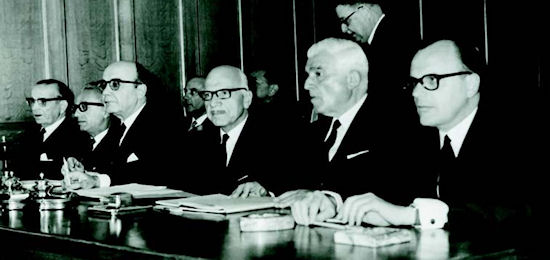On the other hand it is quite possible that your knowledge of the Greek language is much more profound than you can imagine. How much can somebody say in English using only Greek words?
On September 26 1957 and October 2nd 1959, Xenophon Zolotas, being at the time chairman of the Bank of Greece, gave two speeches at meetings organized by the International Bank for Reconstruction and Development. These speeches were given in English with the use of Greek words only, with the exception of articles and prepositions.
9/26/1957
Kyrie,
I eulogize the archons of the Panethnic Numismatic Thesaurus and the Ecumenical Trapeza for the orthodoxy of their axioms, methods and policies, although there is an episode of cacophony of the Trapeza with Hellas.
With enthusiasm we dialogue and synagonize at the synods of our didymous Organizations in which polymorphous economic ideas and dogmas are analyzed and synthesized.
Our critical problems such as the numismatic plethora generate some agony and melancholy. This phenomenon is characteristic of our epoch. But, to my thesis, we have the dynamism to program therapeutic practices as a prophylaxis from chaos and catastrophe.
In parallel, a pan ethnic unhypocritical economic synergy and harmonization in a democratic climate is basic.
I apologize for my eccentric monologue. I emphasize my eucharistia to you Kyrie, to the eugenic and generous American Ethnos and to the organizers and protagonists of this Amphictyony and the gastronomic symposia.
10/2/1959
Kyrie,
It is Zeus’s anathema in our epoch for the dynamism of our economic and heresy of our economic methods and policies that we should agonize between the Scylla of numismatic plethora and the Charybdie of economic anemia. It is not my idiosyncrasy to be ironic or sarcastic but my diagnosis would be that politicians are rather cryptoplethorists.
Although they emphatically stigmatize numismatic plethora, they energize it through their tactics and practices. Our policies have to be based more on economic and less on political criteria. Our gnomon has to be a metron between political, strategic and philanthropic scopes. Political magic has always been ant economic.
In an epoch characterized by monopolies, oligopolies, monopolistic antagonism and polymorphous inelasticities, our policies have to be more orthological. But this should not be metamorphosed into plethorophobie, which is endemic among academic economists.
Numismatic symmetry should not antagonize economic acme. A greater harmonization between the practices of the economic and numismatic archons is basic. Parallel to this we have to synchronize and harmonize more and more our economic and numismatic policies pan ethnically.
The scopes are more practicable now, when the prognostics of the political and economic barometer are halcyonic.
The history of our didymous organizations in this sphere has been didactic and their Gnostic practices will always be a tonic to the polyonymous and idiomorphous ethnical economies. The genesis of the programmed organization will dynamize these policies. I sympathize, therefore, with the apostles and the hierarchy of our organizations in their zeal to programme orthodox economic and numismatic policies, although I have some logomachies with them.
I apologize for having tyrannized you with my Hellenic phraseology. In my epilogue, I emphasize my eulogy to the philoxenous autochthons of this cosmopolitan metropolis and my encomium to you, Kyrie, and the stenographer.





